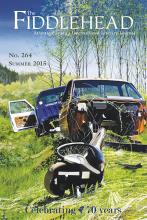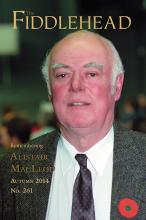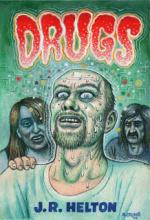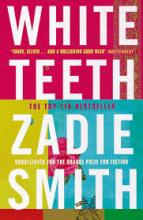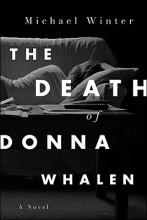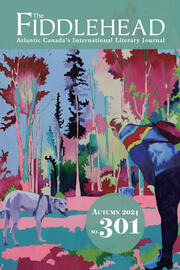fiction
By eight o'clock they were both waiting for Margaret.
The Summer 2015 all-fiction is now available!
Posted on July 10, 2015
The Fiddlehead summer fiction issue is now available, and it’s the perfect read whether you’re lounging at the beach or sitting in a hammock. Spend those long, lazy, hazy days of summer, luxuriating in the fictional worlds of the fifteen stories gathered here. We have stories from established national and international writers such as Daniel Woodrell, D.R. MacDonald, and Kathy Page and stories from up-and-comers such as Charlie Fiset, Rod Moody-Corbett, and Mona’a Malik. And that's just some of the authors found within! . . .
An Interview with Lisa Alward
Posted on May 13, 2015
By Reid Lodge
Lisa Alward has won The Fiddlehead's 24th annual Short Fiction Prize for her story "Cocktail." Originally from Halifax, Lisa Alward has a master’s degree in English from the University of London and was the Literary Press Group’s first sales manager. She presently lives in Fredericton, where she teaches courses in clear writing and has worked as an editor and freelance writer. She has been writing short fiction for three years. “Cocktail,” her second story to be published, is inspired by the cocktail party world of the sixties and early seventies.
An Interview with Fiction Editor Mark Anthony Jarman
Posted on March 16, 2015
By Fiddlehead Staff
Fiction co-editor Mark Anthony Jarman's new book of stories Knife Party at the Hotel Europa has just been released by Goose Lane Editions and is already getting some great reviews. Adam Lawrence at Rover calls Mark a "comfortable outsider" and says of the book: "a sense of transience haunts all the stories." The Fiddlehead asked him some questions about his book, his process, and what he's working on now.
An Interview with Charlie Fiset
Posted on December 1, 2014
By Greg Brown
Charlie Fiset's story "Maggie's Farm" appears in the Autumn 2014 issue.
Her story is a fictitious account based on Fiset’s own European travels, imbued with a Greek mythological theme drawn from Homer’s Odyssey. This story was originally part of Fiset’s creative thesis for her MA in Creative Writing. Fiset was kind enough to offer some insight into “Maggie’s Farm” and her creative process, in response to the following questions.
An Interview with Myler Wilkinson
Posted on May 8, 2014
By Greg Brown Myler Wilkinson has won the 23rd annual Short Fiction Prize for his story "The Blood of Slaves." Myler Wilkinson has published award-winning short stories set in British Columbia in journals such as Prism International and Pierian Spring. He has spent extended periods in Russia and has written three books, including Hemingway and Turgenev: The Nature of Literary Influence. He lives in the Kootenay region of British Columbia. His winning story is written from the point of view of Anton Chekhov and is dedicated to the memory of Alexander Vaschenko, friend of the heart, mentor.
Don't Judge This Book By Its Title
Posted on October 10, 2012
By Zachary Alapi
A Review of J.R. Helton's Drugs
The subject matter of J.R. Helton’s Drugs (Seven Stories Press) might at first appear self-evident, but it is the combination of imbibed adventures, personal struggle, and the exploration of the effects various drugs have on the individual and his/her place in society that make this fictionalized memoir a layered, gripping read.
Grumpy Old Men (On Richler and Sendak)
Posted on November 24, 2011
By Sarah Bernstein
At my Jewish high school in Montreal, Mordecai Richler, of course, was a bit of a hero. Whether or not he liked it, and even though he relentlessly lampooned the Jewish community, he was still one of ours. February at our school was public speaking month. So, every February, the teachers compiled and distributed a list of quotations to all of us groaning, gawky teenagers — possible speech topics from which we were to choose. . . .
Breathe, Just Breathe: Christina Cooke on Zadie Smith's White Teeth
Posted on November 9, 2011
By Christina Cooke
Commendations on the novel’s thematic triumphs need not be contrived by this humble author as institutions such as The New Yorker, Guardian and Financial Times have safely lionized this text as one of the most celebrated of the past two decades. But the most striking yet undervalued aspect of White Teeth, from my reading, is Smith’s awareness of the constrictions placed upon writing by those reading it — of the insistent and insufferable question demanded ad naseum, “but what does this mean?" . . .
Documentary Fiction and The Death of Donna Whalen
Posted on August 16, 2010
By Holly Luhning
The practice of incorporating historical or “real-life” events in a fictional work is common. But the term “documentary fiction” isn’t one I’ve often heard applied to a novel.
